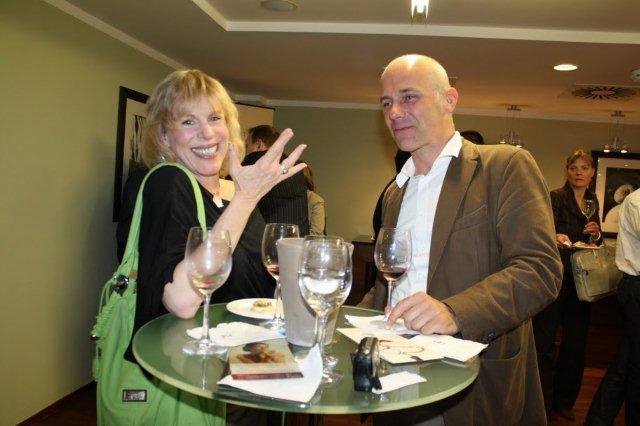Note to Self: Accept any and all invitations which are not either (1) prohibitively expensive or (2) a danger to life and limb. 
In three weeks, I have heard three classical piano concerts, one singer of American folk blues (definitely a low point), a private salon featuring vocal performance of classical Finnish compositions, a performance of Japanese flute, and one surprisingly good Hungarian Swing band. I've been to three wine tastings (one of which I got in from at two o'clock this morning), a hash that took me tramping through the Buda woods, an art and antiques fair, a political brunch, an International Women's Club event, and an open house with the "cream of Hungarian intelligentsia." I've had coffee, cocktails, meals, and Turkish baths. I've been to a fashion show by a Russian designer who works in Germany, lunch at the home of a woman from Azerbaijan, a Turkish boat ride down the Danube, and a six-course winemaker dinner in the Grand Corinthian atrium.
That is, by far, more invitations than I received in two years after moving to New England---which may say as much about New England as it does about Budapest. But never mind. It's great. Having a friend here to get the ball rolling certainly helped, but only three invitations came directly from my old friend, who has reclusive tendencies. I'm sure my state of mind and my readiness to be out of mourning helped, too. But I think there is another factor. It is called the Ex-Pat Community. There are 40,000 expatriates in Hungary. I think I have met about 50 of them, which is just a drop in the bucket. I'm working on the rest.
I got lucky my first week. At the first private concert I attended with my friend, three days after arriving, I met a well-known music patron, who invited me to two other events. I was fortunate in being seated next to an extraverted woman of about my age, who moved here last fall. We exchanged information, and she immediately started sending me links and inviting me to expat events, where I met more people, who invited me to more things, and so on. People give you their card. They take yours. They call or email and invite you to lunch or coffee. They know how it feels to be the new kid, and not know anything or anyone, so they tend to be gracious and generous in the extreme.
Of course there are always a few jerks. There was the misplaced Tea-Bagger who worked for Bechtel, "rebuilding" Iraq, who retired here. He spent an hour sounding off about immigrants in America who don't learn our language--this while speaking unapologetic English to our waiter. But wherever they came from, for whatever reason, they got out of Dodge and created something new for themselves.
That makes expatriates interesting people. Many have lived in multiple places around the world--Singapore, the States, Paris, the Netherlands, Africa, Dubai, the Ukraine, you name it. They could parachute down anywhere and make it work. They've learned to walk over to someone they've never met and start a conversation. They know how to figure out where to get what they need, whether it's an apartment or soy milk. They are primo net-workers. They find their power, not in hoarding information, but in sharing it.
Ex-pats have the guts and the imagination to try something new. They can create a life out of nothing. They're experimental. They've seen life from enough different perspectives that they know there is more than one way to skin a cat. They seem not to be as hung up on looking good as the rest of us. After all, they have to be willing to look foolish sometimes to make themselves understood in a language they may speak haltingly, if at all. The other night at the wine bar, I met an American from Kansas, who was speaking Hungarian with the owner. Hungarian is one of the most difficult languages to learn, having 40 letters, fourteen vowels, and no roots in common with any other Indo-European language except Finnish. I was impressed.
"Wow," I said, "You speak Hungarian."
"Badly," he said.
"Yeah," I said. "I aspire to that."
I've noticed something in the past few weeks. Ex-pats seem happier than the ordinary run of people. They like their lives. A few feel stuck with decisions they made and later came to regret, but most say they love living here. There's a lot to love.
Life in Europe is of a manageable scale. People have time to live their lives, meet their friends, have a meal, and listen to a concert (many of which are free). They take vacations. They travel. It's affordable. You can go to the opera or out for a glass of wine for less than $5. Life does not revolve around work, nor are relationships predominantly transactional. I spent an entire three-hour dinner in conversation with strangers last night and no one asked anyone else at the table what they did for a living. That's different.
Geographic solutions to personal problems have gone out of fashion. Part of the American delusional bubble is the belief that everyplace is really the same, so going somewhere else won't fix anything. If what's wrong with your life is a bad attitude, that's probably true. Bad attitudes travel. But if it's something else, like a paltry social life, feeling trapped in the rat race, or maybe just needing to hit the reset button and set some new anchors, a change of location and culture might be just the thing.